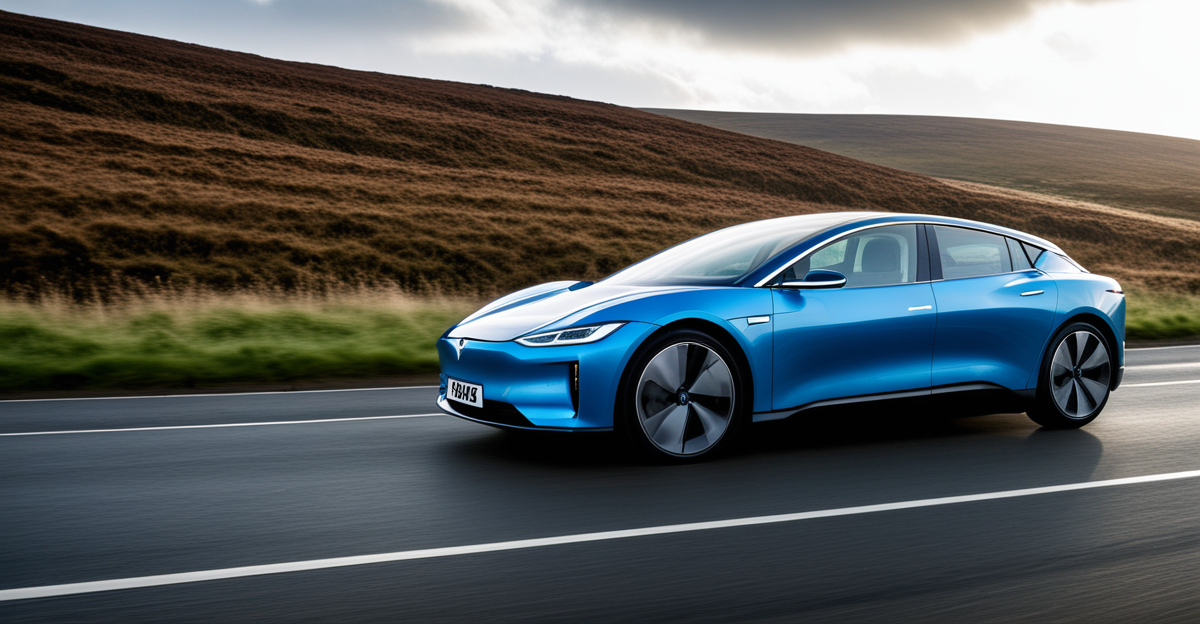Key Government Policies Shaping the Future of Electric Vehicles in the UK
Electric vehicle (EV) adoption in the UK is strongly influenced by UK EV government policy, designed to accelerate the transition to zero-emission vehicles. Central to this effort is the UK petrol and diesel ban, set for 2035, which prohibits the sale of new petrol and diesel cars. This ban profoundly shifts the automotive market, compelling manufacturers and consumers alike to prioritize electric models.
This legislation not only phase-outs fossil fuel vehicles but also drives innovation and infrastructure investment. By 2035, the ban aims to significantly reduce road transport emissions, supporting the UK’s net-zero climate targets. The government has paired this with electric vehicle legislation that supports clean vehicle adoption, including stricter emission standards and incentives for low-carbon alternatives.
In parallel : What are the key innovations driving the future of UK automotive manufacturing?
Incentives play a pivotal role in this policy landscape. Recent government initiatives include grants and subsidies that lower the upfront cost of EV purchase, making electric cars more accessible. Looking ahead, there are plans to expand these incentives, integrating tax benefits and support for businesses investing in EV fleets. This strategic approach propels consumer shift towards electric mobility.
To underpin the EV rollout nationwide, strategic plans emphasize enhancing the supporting infrastructure and regulatory framework. The government coordinates with regional authorities and private entities to ensure an equitable roll-out of charging networks and EV services, aligning with legislation aimed at broad-based adoption. The UK’s commitment to phased policy advancements signals a comprehensive push towards sustainable transport, making these government policies foundational to shaping the future of electric vehicles.
In the same genre : What Innovations Will Shape the Future of UK’s Automotive Industry?
EV Infrastructure Developments and Charging Network Expansion
The electric vehicle charging infrastructure UK is critical for mainstream EV adoption. Progress in deploying EV charging stations has accelerated, supported by both government funding and private investment. The expansion of the UK public charging network ensures more accessible and reliable charging options, vital for alleviating range anxiety among drivers.
Government initiatives focus on increasing the density of charging points across urban and rural areas. Projections indicate a steady rise in station numbers, aiming to meet the growing demand fueled by the UK EV government policy pushing EV uptake. Investments target rapid chargers on highways and fast-charging hubs in towns, enhancing convenience and trip planning for EV users.
Private sector players contribute significantly by installing chargers at workplaces, retail locations, and residential complexes. This collaborative effort between public and private sectors is designed to establish a seamless and user-friendly charging ecosystem across the UK. Moreover, addressing regional disparities in charging access is part of strategic infrastructure planning, ensuring equitable availability beyond metropolitan centers.
In summary, expanding the electric vehicle charging infrastructure UK through coordinated funding, strategic deployment, and inclusive coverage is essential to fulfilling the UK’s broader goals outlined in the electric vehicle legislation and supporting the UK petrol and diesel ban targets.
Technological Innovations Influencing the UK EV Market
Advancements in EV technology advancements UK have been pivotal in enhancing electric vehicle performance and acceptance. One major breakthrough lies in battery technology, where improvements in energy density and longevity contribute significantly to extending electric vehicle range. These innovations reduce range anxiety, a common barrier to adoption, by allowing EVs to travel further on a single charge.
Fast-charging technology milestones have transformed charging times, enabling EV users to recharge quickly, often within 20-30 minutes for an 80% battery replenishment. This progress supports the usability of EVs for long-distance travel, making them more practical for varied driving needs. Alongside hardware improvements, the integration of smart grid systems and vehicle-to-grid (V2G) solutions represents a forward leap. These technologies allow EVs not only to draw electricity efficiently but also to feed power back into the grid during peak demand, enhancing energy distribution and grid stability across the UK.
Collectively, these EV technology advancements UK address critical concerns about range and convenience while opening avenues for sustainable energy management. The ongoing innovation in battery technology and charging infrastructure continues to push the UK market closer to widespread EV adoption.
Market Growth Forecasts and Adoption Trends
Electric vehicle adoption rates in the UK have shown impressive acceleration, fueled by the momentum generated from UK EV government policy and expanding infrastructure. Recent EV sales statistics UK indicate a steady rise in new registrations of electric models, with forecasts suggesting this trajectory will continue. According to projections, the UK EV market forecasts predict a significant increase in EV market share by 2030, potentially reaching over half of all new car sales. This reflects growing consumer confidence in electric vehicles, supported by ongoing incentives and infrastructure improvements.
Consumer adoption trends reveal several key drivers and barriers. While the upfront cost remains a concern for some, increasing affordability and government incentives ease this challenge. Many buyers are motivated by environmental considerations, but some hesitation stems from concerns around range, charging availability, and vehicle variety. Addressing these issues is critical for sustaining the adoption momentum seen today.
Looking further ahead, the UK EV market forecasts for 2040 envision near-total replacement of internal combustion vehicles with EVs, aligning with the UK’s climate goals and the UK petrol and diesel ban. This market expansion will likely be supported by evolving electric vehicle legislation that fosters innovation and consumer confidence. The synergy between regulatory frameworks, technological advances, and positive consumer trends strongly suggests that electric vehicles will become the dominant choice on UK roads in the coming decades.
Main Challenges to Widespread EV Adoption in the UK
Essential hurdles and strategic considerations for the EV transition
One of the foremost challenges for electric vehicles UK lies in the capacity of the national grid. The rapid increase in EV ownership amplifies electricity demand, necessitating substantial UK EV grid capacity upgrades. Without reinforcing generation and distribution infrastructure, the grid risks congestion and outages during peak charging periods. To address this, coordinated investment is crucial to modernize power networks, incorporate renewable energy sources, and implement smart grid technologies for efficient load management.
Another significant barrier is the electric vehicle cost barriers faced by consumers. Despite falling prices over recent years, the upfront cost of EVs remains higher than comparable petrol or diesel models for many buyers. This financial hurdle slows broader market penetration, especially among low- and middle-income households. Government subsidies and incentives help offset these costs, but long-term affordability depends on continued technological progress, economies of scale in production, and expanded second-hand markets.
Furthermore, challenges for electric vehicles UK include the limited variety of EV models currently available and ongoing supply chain constraints. Consumers desire diverse options across vehicle types, price points, and features, yet many segments remain underserved. Supply chain disruptions, especially for critical components like batteries and semiconductors, hinder production scaling and prolong delivery times. Addressing these issues requires strategic industry collaboration and investment to enhance manufacturing capacity and diversify supply sources.
In summary, successfully overcoming grid capacity limitations, reducing cost barriers, and expanding vehicle choice are critical to accelerating electrification in the UK. These combined efforts must be supported by continued innovation and policy frameworks aligned with the UK’s EV ambitions.
Environmental Impact and Sustainability of UK EVs
Electric vehicles in the UK play a vital role in reducing greenhouse gas emissions, making a measurable difference in combating climate change. The shift to zero-emission vehicles UK leads to significant declines in tailpipe pollutants such as nitrogen oxides and particulates, directly improving air quality in urban and industrial areas. Studies show that even accounting for the electricity generation mix, EVs contribute to lower overall carbon emissions compared to petrol and diesel counterparts, reinforcing their environmental value.
Beyond the use phase, EV sustainability also depends on managing the entire lifecycle of electric vehicles. This includes the sourcing of raw materials, battery manufacture, and end-of-life processes. Sustainable practices emphasize responsible mining of battery components and the incorporation of recycling systems to reclaim valuable materials. Efficient battery recycling reduces reliance on virgin resources and lowers environmental impacts associated with production. The UK is investing in research and infrastructure to enhance battery repurposing and recycling capabilities, contributing to a circular economy model within the EV sector.
Looking forward, the environmental benefits of EVs in the UK will be amplified as the electricity grid continues to decarbonize. As renewable energy sources comprise a larger share of power generation, charging electric vehicles becomes even cleaner, accelerating progress toward national climate goals. The commitment to electric vehicle legislation underlining sustainability principles ensures that EV adoption aligns with the country’s broader transition to net-zero emissions, fostering eco-friendly transport and long-term environmental resilience.
Major Industry Players and New Market Entrants
The UK electric vehicle landscape is increasingly shaped by both UK electric vehicle manufacturers with established legacies and dynamic new entrants innovating rapidly. Among the leading EV brands UK, traditional automotive giants have accelerated their electrification strategies, committing substantial investments to expand their electric model portfolios. These companies focus on leveraging brand trust while integrating advanced EV technology advancements UK to meet evolving market demands and regulatory requirements.
Simultaneously, emerging companies and startups are making notable contributions to the UK’s EV sector, often focusing on niche segments or innovative technologies. These new players bring agility and fresh perspectives, fostering competition and encouraging established manufacturers to enhance their offerings. Their activities include developing bespoke EV designs, pioneering battery technologies, and offering smart connectivity solutions that appeal to tech-savvy consumers.
Collaborations and joint ventures have become critical in driving growth and innovation in automotive industry EVs UK. Partnerships between traditional automakers, technology firms, and battery manufacturers enable resource sharing, reduce development costs, and accelerate time-to-market. These alliances often focus on scaling production capabilities, advancing battery technology, and enhancing charging infrastructure compatibility — all crucial for sustaining UK EV market growth.
In summary, the interplay between established UK electric vehicle manufacturers, innovative startups, and strategic collaborations is pivotal in advancing the UK’s EV ambitions. This ecosystem fosters a competitive yet cooperative environment that accelerates the transition towards widespread electrification across the country’s automotive industry.
Consumer Sentiment, Education, and Policy Advocacy
Understanding UK EV consumer attitudes is crucial for accelerating electric vehicle adoption. Many consumers appreciate the environmental benefits and lower running costs of EVs, yet some remain hesitant due to misconceptions about range, charging convenience, and initial purchase price. These concerns highlight the ongoing need for clear, accessible information that addresses common questions and corrects misunderstandings.
Effective electric vehicle education initiatives play a vital role in shifting public perception. Programs that provide practical guidance on EV ownership, charging options, and total cost of ownership help demystify the technology. For example, community workshops and online resources tailored to diverse audiences enable potential buyers to make informed decisions grounded in accurate facts rather than uncertainty or outdated impressions.
EV policy advocacy also influences consumer sentiment by ensuring that government policies reflect user needs and industry realities. Advocacy groups and industry associations engage with policymakers to promote incentives, infrastructure investment, and standards that support wider EV adoption. Their activities include raising public awareness, campaigning for improved infrastructure, and lobbying for policies that reduce barriers such as high upfront costs or insufficient charging networks.
In sum, fostering positive UK EV consumer attitudes, bolstering electric vehicle education, and supporting active EV policy advocacy together create a receptive environment. This environment encourages more people to embrace EVs confidently while helping policymakers craft effective, responsive strategies aligned with public demand and technological progress.








